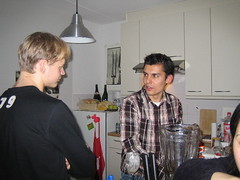Which in English translates as "To whom belongs Bolivia?". This dutch documentary, by Mariëtte Heres, was filmed during the june riots in La Paz that ousted Carlos Mesa from the presidency. It is mainly based on interviews made to very different social actors, the first an indigenous woman market seller and the other a fairly wealthy white occupying the position of hydrocarbons overseer (Superintendente de hidrocarburos).
Our market seller raises three children by herself in a room deprived from electricity due to lack of money. On the other hand our man has a quite enormous house, a SUV car, healthy children and much material comfort. Heres contrasts their different living conditions and especially their differing opinions on the management of Bolivia's most precious natural resource: gas.
Our market seller supports nationalization, in fact, she actively participated in the turmoil I already mentioned above. She motivates her choices, saying that the multinational corporations are plundering Bolivia together with the white elite. She sincerely believes that she is fighting for the best future possible of her children. On the other hand the man thinks (also sincerely, I presume) that the nationalization is a mistake. He offers the usual reasoning: capital, international agreements, etc.
The movie offers more interviews to the social movements leaders, some presidential candidates such as Evo Morales and Samuel Doria Medina and some other persons.
From the film I gather that Heres supports the market seller's view, that market economies are evil and multinational corporations too. I could not follow the debate after the screening very well (it was in dutch), but I believe it confirms my impressions.
I don't claim the issues don't exist. They do and they are serious. However, the film simplifies them and it doesn't offer anything new.
However, we can interpret the film in a way that Heres did not intend. Forget for a minute the merits and demerits of our market seller and our government official for a second. Instead, note that the film might well be about mistrust in Bolivian society. Our market seller thinks that the government official is under hire by multinational corporations, while this one believes that she does not have a say in this matters because she is not well-informed on them.
This lack of trust can be seen in many places in Bolivian society, even more so in the presidential elections: Indigenous leaders and leaders of social movements would doubt Tuto Quiroga's will to govern for the benefit of the majority of bolivian society. Now consider the other side, medium and high class persons might doubt Evo Morales' statesmanship.
The political actors may be doing (some of them at least) what they sincerely think is the best action. But they don't trust the actions of the others. It is important to address the sources of mistrust, make political actors acknowledge the gripes of each other and work towards a common solution that minimally satisfies their needs. Without this understanding and acknowledgment of these issues, more conflicts are inevitable, whoever becomes elected.



